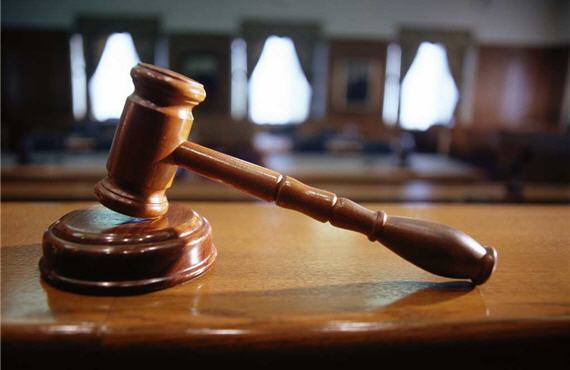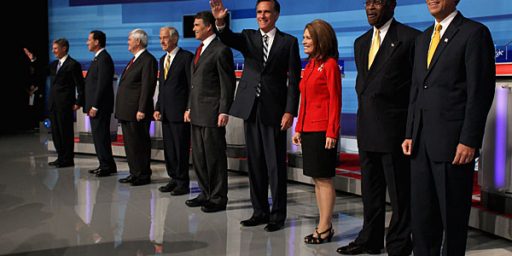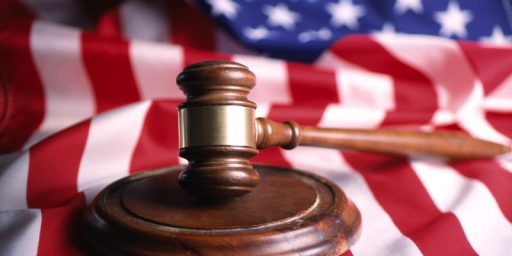Perry, Gingrich Appeal Ruling Keeping Them Off Virginia Ballot
Rick Perry and Newt Gingrich are appealing the ruling that they cannot get on the Virginia ballot. Their argument doesn't amount to much.
With less than a week to go before absentee and military ballots must be mailed, Rick Perry and Newt Gingrich have each filed an appeal of the decision handed down by Judge John Gibney on Friday denying their request to be placed on the Virginia primary ballot:
Texas Gov. Rick Perry’s lawyers filed a motion with a federal appeals court Sunday, seeking to win him a place on the Republican presidential primary ballot in Virginia even though his campaign failed to gather the 10,000 signatures required by state law.
The move came after another contender for the Republican presidential nomination, Newt Gingrich, filed a notice of appeal Saturday of U.S. District Court Judge John Gibney’s ruling Friday that Perry, Gingrich and other candidates who failed to make the cut waited too long to pursue their legal challenges, which were brought as ballot printing was getting underway and the mailing of absentee ballots was about to commence. However, Gibney said Perry and the other candidates would like have prevailed on their claim that a Virginia requirement that ballot petition circulators be Virginia residents violates the Constitution.
In a motion filed at 7 A.M. Sunday with the Richmond-based U.S. Court of Appeals for the 4th Circuit, Perry’s legal team argues that it would have been too speculative for them to file suit before Perry failed to make the 10,000 signature threshold last month. Perry asks that his name be placed on the March 6 ballot or, at a minimum, that the printing of ballots be suspended until his lawsuit can be resolved.
Shortly after Perry filed his Motion for Injunction Pending Appeal, Gingrich’s lawyers followed up with a similar filing. Shortly after that, the Court of Appeals issued an order requiring the Commonwealth of Virginia to file responsive papers by tomorrow. Quite honestly, after reviewing the motion, I don’t think the Virginia Attorney General’s Office is going to have much trouble decimating the argument that Perry relies on, and defending Judge Gibney’s ruling.
Here, for example, is how the Perry camp answers the Judge’s finding that they unreasonably delayed seeking legal redress of the alleged violation of Perry’s Constitutional rights created by the requirement that petition circulators by registered to vote in Virginia:
Movant first suffered harm as a result of Respondent’s actions and Virginia’s unconstitutional election law on December 23, 2011 when Defendant Mullins made his preliminary decision that Movant did not submit a sufficient number of petition signatures to appear on Virginia’s Republican primary ballot. Before Defendant Mullins made his preliminary decision, Movant’s injury was merely speculative, and not justiciable, as Movant very well may have succeeded in his efforts to secure the requisite number of petition signatures. See Public Citizen v. Miller, 813 F. Supp. 821, 827 (N.D. Ga. 1993), aff’d 992 F.2d 1548 (11th Cir. 1993) (per curium) (finding a plaintiff’s constitutional claims challenging a majority vote statute “were not clearly ripe for adjudication prior to the run-off election” because plaintiff might have succeeded in winning such election, thereby making the constitutional challenge moot) (citations omitted). The District Court found Movant’s injury began on August 13, 2011, the date on which he filed his candidacy for president, due to his inability to spread his message at that time. (Doc. #73 p. 10-11). The Court’s logic potentially yields incongruous results. Under the District Court’s view, any candidate could wait until the day the petition signatures are due in Virginia to declare themselves a candidate for president and then assert a challenge to the constitutionality of section 24.2-545 of the Virginia Code which would not be barred by laches.
Another illogical result of the District Court’s reasoning is that it would require Movant, or any candidate for the Presidency, to pre-emptively apply for
injunctive relief while there remains a possibility that they may collect the requisite number of signatures to appear on the primary ballot. This is absurd. Candidates for the presidency are focused on running for president, not on fighting legal battles to pre-emptively hold state election laws unconstitutional. When Movant filed his candidacy, he expected to be able to comply with section 24.2-545 of the Virginia State Code. Movant timely, and steadfastly, moved to protect his constitutional rights once his claim was ripe, and he cannot be charged with inexcusably or unreasonably delaying the filing of this suit.
This argument is absurd. As Judge Gibney noted in his ruling on Friday, the damage that Perry and the others suffered if their argument about the unconstitutionality of the Virginia statute is accepted as true was to their rights under the First Amendment to collect signatures in support of their campaign’s effort to get on the ballot in Virginia. That damage would have occurred regardless of whether or not they would have been able to collect the 10,000 signatures required under Virginia law. Accordingly, the appropriate date to look at when discussing when they were harmed by Virginia law would be, as Judge Gibney stated, the date on which they were forbidden from using out-of-state petitioners to help them get on the Virginia ballot. That date was July 1st, the first date Virginia law allowed candidates to begin gathering signatures, for Gingrich, Santorum, and Huntsman, and August 13th, the date he declared his candidacy for the Presidency, for Rick Perry. The fact that they didn’t take any action to challenge the law is evidence of the fact that they did, in fact, “sleep on their rights,” and their effort to try and raise an argument that should have been raised five months ago was correctly rejected by the District Court.
Even more absurd is the argument that the candidates would not have filed a lawsuit challenging the Constitutionality of the residency requirement before the deadline because they expected to be able to collect enough signatures to get on the Virginia ballot. That alone strikes me as an admission of a lack of due diligence. If Perry or his campaign truly believed that the candidate’s Constitutional rights were being violated by the Virginia law, then why wait until the end of 2011 to bring the issue up? The reason, of course, is because the thought never occurred to them before December 22nd when they realized that they hadn’t collected enough signatures to qualify for the ballot. While that’s not a legal argument in and of itself, it strikes me as evidence of just how disingenuous this Constitutional argument really is. If your rights are being violated, you don’t say “oh forget about it, I’ll just see how this works out before deciding what to do about it,” you fight. The only reason Perry is raising the argument now is because, thanks mostly to his campaign’s own negligence, he failed to do what needed to be done to get on the Virginia ballot.
The motion then asks the Court to engage in what can only be called the most blatant case of judicial activism ever:
Because of the date Movant filed suit, the District Court indicates it can only speculate as to whether Movant would have been able to secure the 10,000 petition signatures required under Virginia law. The purpose of this requirement, which Movant also contends is unconstitutional, is to show legitimate strength amongst the electorate.
Movant is a nationally-recognized Republican candidate for the presidency. He secured and submitted over 6,000 petition signatures following Virginia’s”likely . . . unconstitutional” election laws. As discussed thoroughly above, Movant did not sleep on his rights in seeking redress for Virginia’s violations of his constitutional rights, and he should not be punished because of the Respondents’ claim Movant is without remedy due to his inability to show the support of the electorate. Movant has demonstrated this support both on a national level and in Virginia, and this Court should order his name placed on Virginia’s Republican primary ballot.
In other words, we didn’t really comply with the law, we failed to do anything to protect the Constitutional rights we now claim to have been violated, but put us on the ballot anyway. I’ve learned over the years that anything is possible once you walk into a courtroom, but I’d be incredibly surprised if the Fourth Circuit bought this argument.
Here’s the Motion:
Perry et al v. Judd et al Motion For Injunction Pending Appeal







I suppose these candidates just have to keep on fighting. Otherwise they would look ignorant and foolish, and we wouldn’t want that, now would we?
I think this falls into one of those “pound the table” cases….
Since it’s an election, the Appeals Court may nonetheless come up with some corkscrewy rationale to get the squawkers on the ballot, basically boiling down to: “our Republican primary is going to look awful silly if Ron Paul and Mitt Romney are the only two on the ballot.” (Expect a lot of “public policy” garbage in said case.)
O.T. did everyone see where Hawaii has finally lost its temper and is asking for La Taitz to be labeled a “vexatious litigant” and sanctions? Expect no joy in Birferville soon….
@grumpy realist:
Given the conservative — not so much politically as in the judicial sense meaning that they have been reluctant to step outside the bounds of the law — nature of the 4th Circuit, I doubt that any three judge panel is going to be interested in “some corkscrewy rationale to get the squawkers on the ballot.”
As much as I hate to say it, the candidates have a point. Three federal circuit courts have held that residency requirements for petition signature gatherers. While none of these have jurisdiction over Virginia (that would be the 4th Circuit), it is heavy precedent in their favor
Nader v. Brewer, 531 F.3d 1028 (9th Cir. 2008)
Krislov v. Rednour, 226 F.3d 851 (7th Cir. 2000)
Chandler v. City of Arvada, Colorado, 292 F.3d 1236 (10th Cir. 2002).
Their real argument is ‘those laws were aimed at, you know – Them’.